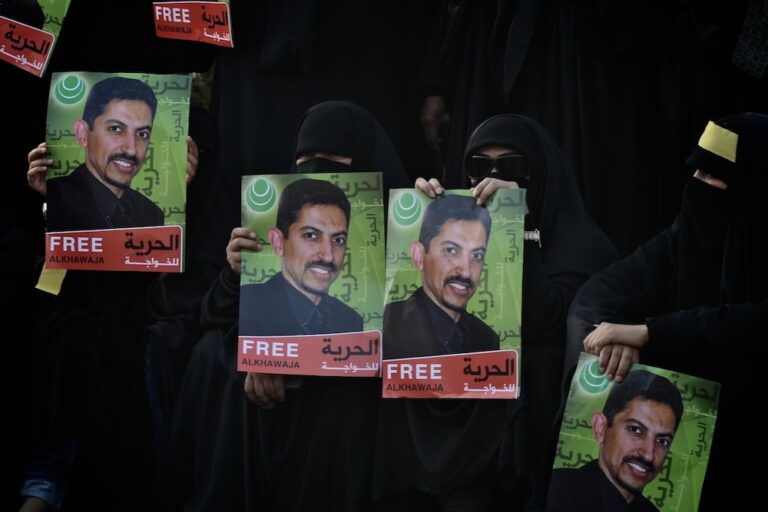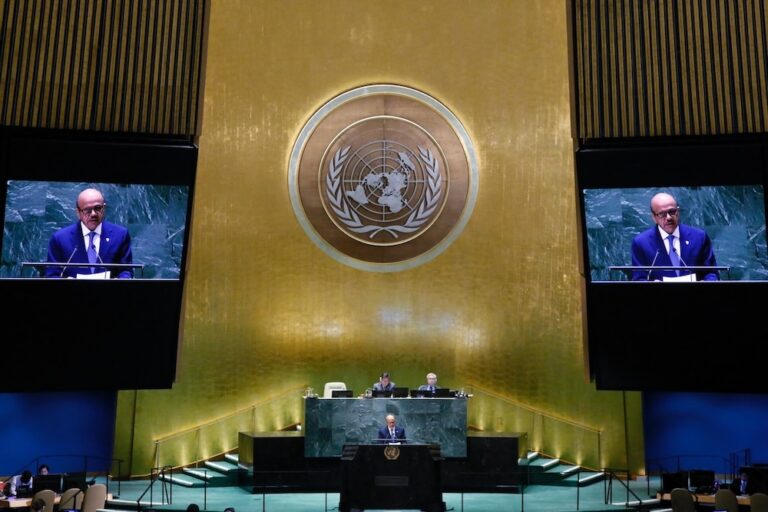If applied to pro-government media outlets, the charter could check incitement against Bahrain’s Shia population, but there are concerns it may instead be used to further censor non-government aligned newspapers.
This statement was originally published on adhrb.org on 8 January 2015.
On 2 December 2015, the Government of Bahrain announced that the editors-in-chief of Bahrain’s six daily newspapers had reviewed and agreed to a new “Charter of Press Ethics” with the Ministry of Information Affairs Authority (IAA). Spearheaded by the Information and Parliamentary Affairs (IPA) Ministry, IPA Minister Isa bin Abdulrahman Al Hammadi stressed that the charter seeks to uphold press freedom and the press ethics of “honesty and objectivity.” Furthermore, it represents a “pledge” to ensure Bahrain’s daily newspapers are upholding the “highest interests of the nation and the citizens…while rejecting division, fanaticism and hatred calls.” King Hamad bin Isa Al Khalifa lauded the charter as playing a “crucial role” in “enlightening” public opinion of the social, political, and economic issues facing the country.
The editors who signed the charter were Anwar Moh’d Abdul Rahman of pro-government Akhbar al-Khaleej; Isa al-Shayaji, of government-aligned Al Ayam; Yousif al-Binkhalil, of pro-government Al Watan; Mu’nis al-Mardi, of government-aligned Al Bilad; Abdulmun’m al-Meer, of Al Naba’; and Dr. Mansoor al-Jamri, of Al Wasat—the last official, quasi-independent newspaper in Bahrain.
The charter ostensibly seeks to support national unity, end media incitement against any particular sect in the country’s media, and preserve “national security and stability in order to serve the national interest.” If applied to pro-government media outlets, the charter could check pro-government newspapers’ incitement against Bahrain’s Shia population that has continued unchecked since 2011. If the government’s past actions are any indication, however, the charter will instead be used to further censor non-government aligned newspapers.
Because the charter does not define “incitement”, what is and is not incitement remains up to the discretion of the IAA. The government’s past inaction to curtail sectarian incitement in government or pro-government newspapers reveals that its definition would likely not include hate language directed toward the majority Shia population. For example, the pro-government paper Al Watan publishes a column by Sawsan al-Shaer that regularly catalogues the supposed terrorist and subversive tendencies of Bahraini Shia. Her column directly associates Bahrain’s Shia with the Iranian government; she once wrote that there is a “lesson” to be learned about “Arab Shia who rushed to be carpets under the feet of Iranian clerics to enter their countries.”
To date, the government has taken no action to censor Al Watan’s columnists. Meanwhile, the Information Affairs Authority (IAA) suspended the quasi-independent Al Wasat newspaper in August 2015, supposedly for publishing an opinion column that spread hatred and “insulted” the king. Al Wasat was only able to resume publishing after its board met with the government to establish “standards” under which the newspaper must publish
Perhaps more worrisome, the charter places responsibility for any violation of the ethics code on the editor-in-chief himself. Thus, should any paper be found “offending religious beliefs or moral values or defamation or discrimination against individuals or groups in society,” the basis of which remains subject to the IAA’s discretion, the editor in question will be held in violation of the law. The charter also bans the publishing of any content that could “prejudice the interests of Islamic, Arab, and friendly states,” largely limiting journalists’ ability to criticize any country the government deems an ally.
The government has repeatedly put this prohibition into practice. In February 2014, the IAA claimed that it had to censor non-governmental voices because they tended to broadcast extremist and incendiary content. Since then, the IAA has blocked or shut down more than 1,000 websites, including personal pages and human rights websites. In early 2015, the government suspended the Al-Arab news channel during its broadcast of an interview with opposition group al-Wefaq’s assistant secretary general Khalil al-Marzooq in early 2015. The al-Arab interview had marked the first time that a member of the opposition had received access to local Bahraini television since the 2011 uprising. The IAA later shut down the station permanently, alleging that it lacked “anti-terror standards.”
The charter could be the first in a new series of limitations on free press in the country. Earlier this month, IPA Minister Al Hammadi called for the government to take legislative steps to codify press ethics and “upgrade the press and media message” according to the “directives” of the king through a draft law. Al Hammadi’s call likely refers to the draft media law that the Cabinet approved in September of this year, which would further limit free expression countering the government’s narrative of events. The draft media law would require journalists to “respect the kingdom’s sovereignty, system of governance, icons, institutions and statutory bodies,” thereby further criminalizing criticism of the government.
The Charter of Press Ethics in Bahrain represents another step towards the full criminalization of dissent in Bahrain. Notably, the charter seemingly codifies the 2012 Press Code of Ethics released by the Bahraini Journalists Association, and provides yet another mechanism to censor the country’s limited independent press. By holding newspapers’ editors accountable for maintaining the government’s narrative, the charter represents an implicit threat to both the editor in question and journalists at large. The IAA’s track record of punishing journalists and newspapers that do not toe the government line, and the continued jailing of journalists under the country’s expansive counterterrorism legislation indicates that the Charter represents merely another tool for the government to wield in its campaign against free speech.


